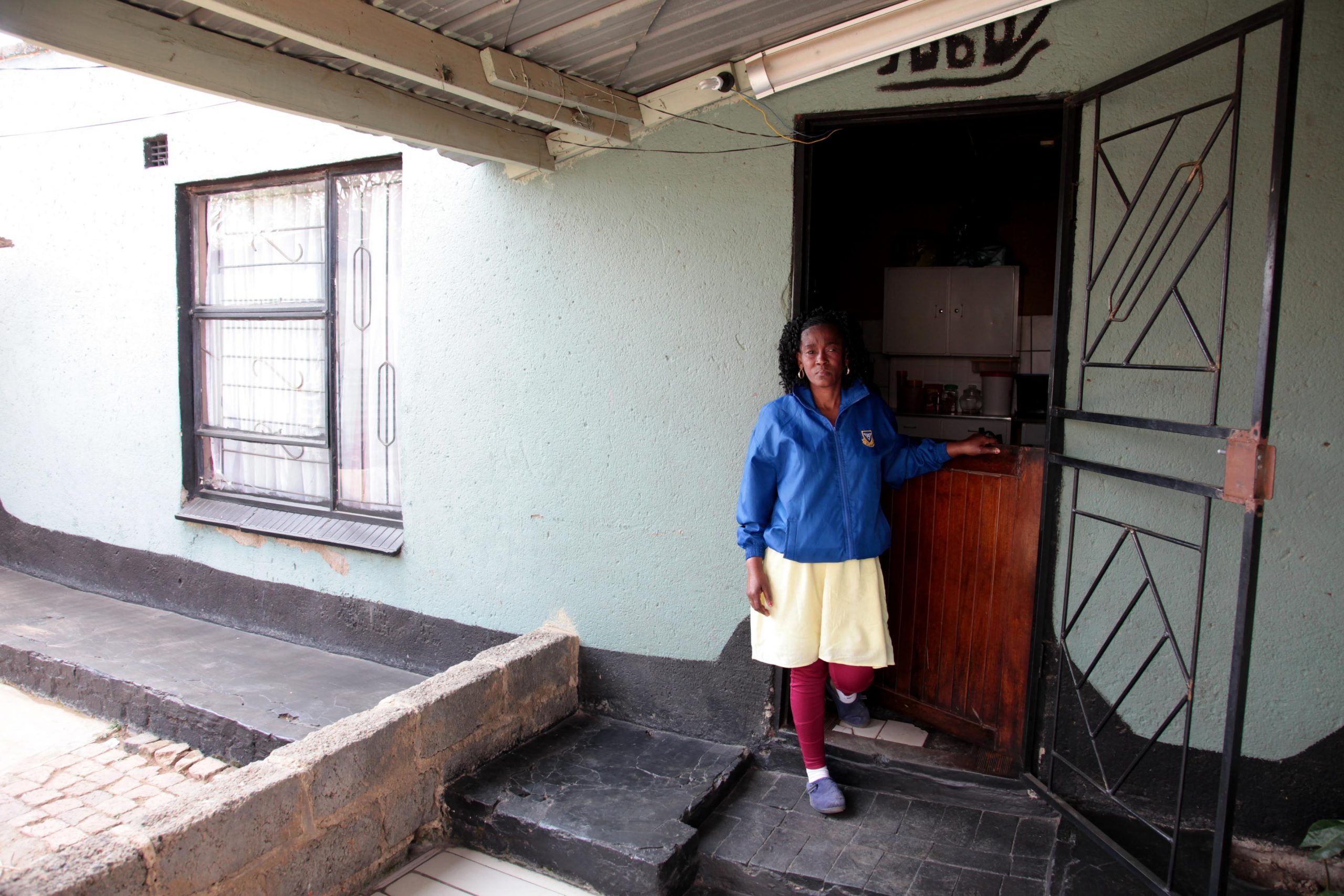Reblocking causes upheaval in Ekurhuleni
The process of making way for roads in the hope that services will follow has left some residents in despair and with half their homes destroyed and open to the elements.
Author:
31 May 2019

On Monday morning, 27 May, Nokwazi Mbatha left home at 5:10am to catch a taxi. She has worked as a domestic worker for the same family in Orange Grove, Johannesburg, for the past 13 years. Mbatha had not been to work since the previous Wednesday, having received numerous threats that her house would be demolished.
At 8am, residents in favour of reblocking began knocking down the blue walls of the house she has lived in for 22 years without her consent. It was a twisted turn in a bitter dispute over the implementation of the contested process in Vusimuzi, Ekurhuleni.
Mbatha, 48, initially agreed to reblocking in Mangosuthu section when she was charmed by the allure of electricity. In a settlement using informal electricity connections and paraffin, this is a luxury of which residents can only dream.
“Everyone wants electricity, some have been threatened and told that if they don’t move they will not get electricity,” alleges Mbatha.
Related article:
Reblocking supposedly develops shack settlements with minimal disruption by ensuring that the space is fit for roads, which helps fast-track the delivery of services such as water, waste collection, drainage and electricity. The process requires people to have parts of their home reduced in size, to give up their living space or to completely surrender their homes.
When Mbatha realised what the process entailed and was informed that her house on tarred Igqili Street would be decreased in size, she changed her mind, opting to continue paying R500 for an informal electricity connection.
She waged a defiant campaign against residents whose interest was to phase in reblocking regardless of the lack of mutual consent or democratic participation.
Mbatha had been vocal about her dissatisfaction with the process, lamenting the fact that she would lose a generous portion of the home for which she had paid.

Red arrows
She bought the stand for just over R900 in 1996 and has a C-form. Officially, this proves that residents have applied for government housing (by filling in “Form C”) and are registered on the housing waiting list. Mbatha says that now people can pay up to R20 000 for a stand.
“We have all applied for housing here. We didn’t even get into Essellen Park, people from Madela did,” she says, adding that there is no mention of title deeds in the talks of reblocking.
On the previous Friday, red spray-painted arrows indicated how much of Mbatha’s home would be demolished. It would be cut on both sides and at the back, forcing her tenants to scramble and build new cramped shacks, and Mbatha to find new space for her furniture, beds and appliances. Residents sang struggle songs outside her house and threatened her until she cried.
When her daughter, Nandipha, 19, finished cleaning on Monday, she did not expect to hear a loud whistle and an angry mob with tools outside the house. Although she had seen them walk up and down the street, peering into the house and gathering in number, she did not pay attention.
Her mother had warned her that community members might show up to try and demolish her house, but she did not think they would come in because they were aware that her mother was against reblocking.
“They said the community agreed that they would demolish even the houses of those against it. I asked them to show me where my mother had signed that she approved of the demolition and they said they didn’t need to do that because this was the work of government and within the law,” she says over the sound of banging and knocking from her mother’s bedroom, which is now a sorry sight.
Nandipha was told to call her mother and tell her to come home. But, having missed work the week before, fearing that her house might be demolished, she refused. Nandipha alleges that the gathered residents threatened her and a friend and accused her of having an attitude.
When Nandipha asked why there were so many people, she was told that “the community members are just here to make sure my mother’s house falls … she cannot want to have a Sandton house in Vusimuzi with this big house”.
She felt angry and powerless.

Change of heart
Outside, while men in overalls work, Nandipha has to make her way through corrugated iron, nails, ladders, wooden slabs and old 20-litre buckets with clothes and appliances scattered all over the ground. The chopped black stoep in the front of the house shows where the demolition began, leading to the agape bedroom where the men are knocking what remains of the walls to ground level.
Inside the house, Nandipha has blocked off the door to the demolished room with four bricks to stop the residents from moving into other parts of the house. Behind the door, beneath a layer of grey dust and rubble, lies what used to be her mother’s bedroom. Her duvet and adornments no longer have the same sparkle and her other daughter’s graduation picture from the University of KwaZulu-Natal looks like it has been through a sandstorm.
Mbatha says that community meetings usually take place on weekends when she is at work, so she heard about reblocking through residents. She knew that in some other parts it had been introduced, but was halted temporarily when people started disagreeing with the idea when they saw that their houses were being reduced in size. Happy Ndebele, 60, is one of those. Her house was demolished over a rainy Easter weekend.
“They demolished mine because I agreed without being aware what this reblocking thing meant. No matter what happens, don’t agree to this, you will lose your home,” Ndebele told Mangosuthu residents.
Mbatha worked her usual shift and returned home at 7pm devastated and unable to talk. She was overcome with emotion. Her house was forcefully demolished without her consent. Her life has been disrupted and she has incurred an unsolicited stressful financial burden.

Simply doing a job
A subcontractor who did not want to be named says they were simply doing their job, adding that residents were demolishing other people’s homes because they wanted electricity. He explained that they faced resistance everywhere, including in Duduza and Germiston, where the process is also being rolled out.
“We stop and come back when the community seems more open to the idea,” he says.
Ekurhuleni spokesperson Themba Gadebe previously told New Frame that reblocking was about development, urging residents to agree to smaller homes because no one should be renting to tenants.
Residents say they need the money from tenants to sustain themselves.
“A lot of us don’t work and we rely on these tenants … So, if he says he is decreasing the stand, where will she send the people who are giving her her livelihood? And I know when you move people somewhere, you give them alternative land,” says one woman.

Waiting game
Mandisa Sisilana, 30, alleges that the councillor of Ward 90 also has tenants in his RDP house and the rule should apply to him, too.
“If you go and measure where he lives and where he expects us to live, you would be shocked to know that it’s twice the size of ours. We don’t want a 10 by 12 while he is in a 17 by 20,” says Sisilana.
Sisilana lives with her husband and three daughters, Lorna, Zethu and Zintle Duba. She works at a beauty salon in Glen Marais.
“I have been missing work since last Wednesday, waiting for these Red Ants they threatened me with. Where will the money to build again come from?” she asks.
As it’s a no work, no pay job, she cannot afford to miss any more days of work.
“It’s full and I am losing,” she says, highlighting that it is the end of the month and she could be making money at the salon.
Her mother-in-law lives in a one-room shack on top of a heap of brown soil that stands over Sisilana’s shack. She recently had a stroke and is physically weak, but will have to find strength from somewhere as both shacks are next in line.

Downsizing and reshuffling
Mbatha says there is nothing she can build in the small space she is now left with and that, even if she could, she doesn’t have the money to finance building.
“If [reblocking] hasn’t happened, they want it. Once it is there, they don’t want it. When it has been damaged, they are crying, they don’t want it,” says Sisilana, adding that in another section, people are still unhappy. “A lot of them agreed to it but at the end they regretted saying yes,” she says.
“Where will your children stay? Where will your grandchildren sleep?” asks another resident, watching as more bricks and grey dust land around the absent Mbatha’s bed.
Ntombizodwa Ntuli, 57, a tenant in Mbatha’s yard who had to dismantle her shack because it was outside the demarcated area, limps on crutches to her son, who is knocking nails into the side of the shack.
She is lucky that Mbatha has allowed her to squeeze a new, smaller shack in front of the house. Her possessions – stashed in bags, plastic and laundry baskets – sit neatly on her single bed, gathering demolition dust.

Hurtful and distracting
Fani Chauke, 44, works as a truck escort and has a family of three. His concern is that the process is temporary.
“We want electricity so we want this thing, but we don’t like that they are saying it is temporary because they are saying they will still move us again to put in the roads and the water pipes at a later stage, so why must we bother rebuilding if this is temporary?” he asks.
Mbatha got an unexpected visit from the Red Ants and EMPD on Thursday night.
Nandipha, a grade 11 pupil at Jiyana High School, says the entire process is hurtful and distracting.
“For some of us, it’s almost June and my focus should be on studying. But how can you study when your home looks like this?” she asks, pointing at the demolished wall. “It’s not nice to see your mom cry,” she adds.
The Mbatha family finally managed to open a case of illegal destruction of property, after some resistance from the police. They are currently seeking legal help.


